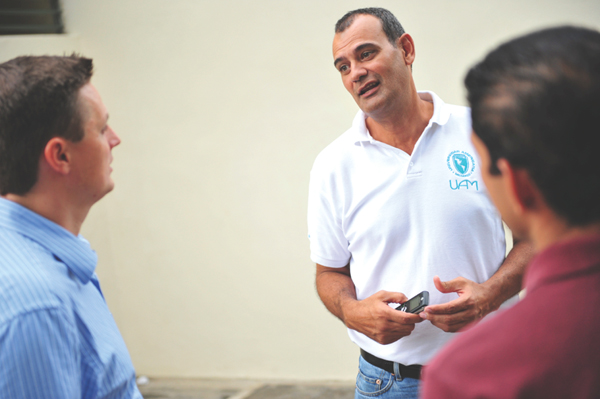
Sending Churches
7 Critical Points When You Can Serve Your Missionary
July 15, 2015
by admin

As believers, we are all called to reach the nations. This might mean a personal call to go, send, welcome, train or any number of other individual tasks. In all likelihood, we will each be called to serve in different ways at different times in our lives.
While each of these tasks can feel a little daunting if we’re un-experienced, it is the “sending” role that leaves many of us particularly baffled. If you are in the role of sender, you may find yourself thinking, “There has to be more to this than simply writing a check.” You are so right.
There are many ways that you can care for the missionaries you are sending and impact the kingdom for good. In fact, there are at least seven specific times when your “more-than-a-check” involvement can make a world of difference in your missionary’s life.
- SUPPORT RAISING
This stage of missionary life has many joys and pleasant surprises. But, as you might imagine, it can also be a time of stress and severe testing. Missionary hopefuls meet hundreds of people and endure many rejections and dead ends. It is easy for them to become discouraged and disillusioned or to even begin doubting their call.You can: Listen without judging. Your soon-to-be missionary may seem unduly pessimistic, overly critical or indulgently self-pitying, but they need someone who cares enough to listen, pray and then be a gentle encouragement. Be a friend who provides perspective and assures them that they will reach their goal. Offer to babysit, help with their PowerPoint presentation, mow the lawn or get the oil changed in their car. Gather together a group who can connect them to potential supporters and who will commit to pray for them daily.
- THEIR FIRST TERM OF SERVICE
Saying goodbye and boarding a plane with a one-way ticket is a huge step. However, it is not generally a difficult time for most missionaries. The excitement of finally being on the field overshadows everything. It is when the novelty of the move wears off – when the initial charm turns to annoyance – that your missionary will need your support. Language study has become more intense and they are painfully aware of how far they have to go. The frequent emails and Skype calls from home that encouraged them during the first few months have dwindled to a mere trickle.You can: Keep in touch! Quick touches via social media can brighten their day. A longer note of encouragement in their inbox will mean a lot. An online face-to-face visit will show how much you care. Ask about how things are going and be a good listener. Don’t feel pressured to give a fix, just walk with them and let them know that you care for and believe in them.
- SICKNESS
Although most foreign countries do not pose the health risks that early missionaries endured, overseas workers still face illness. Changes in climate and exposure to different viruses can physically wear down even those who are in great health. The availability or quality of medical care may be quite different from what they had before they left the States. Especially if a child becomes ill, parents may carry an extra load of guilt when they try to care for their son or daughter.You can: Think of creative and practical ways to help. Offer to find a medical specialist who is willing to consult via phone or online. Try to help with medical bills already incurred, or help pay for travel to a location where the care they need is available.
- MAJOR DISCOURAGEMENT
Missionaries’ work is both their career and their ministry. They gain a sense of fulfillment and self-worth when they get to see their efforts bear fruit. They have high expectations of themselves and often sense their supporters’ expectations as well. But what if “success” doesn’t come? What if, after many years, no church is established? What if the government expels them? Discouragement, self-doubt, a sense of failure or fear of facing supporters can easily overwhelm the missionary.You can: Encourage, support and affirm weary missionaries. Honor them for their faithfulness and for who they are as children of God. Remind them that their identity is found in Christ and that He rejoices over them. A personal visit, if possible, will speak volumes to the discouraged. Laughter is good medicine, too. Find a way to provide whatever would give them a hearty laugh and remind them that the weight of the world is on God’s shoulders and not theirs.
- HOME ASSIGNMENT
Some call it “home assignment” and some call it “furlough.” Whatever it’s called, it is when missionaries return to their home country for a time of reconnection. What it is NOT is a vacation. Home assignment is a busy, busy time of traveling, visiting supporters, reporting on the ministry and even raising more funds. While it is a joy to reconnect with family and friends, it can be intimidating to step back into North American culture and the expectations of others.You can: Understand and seek to ease the pressures of home assignment. Perhaps you can provide a vehicle or a place to live, two things the missionary likely no longer has in North America. Offer to help with presentations to churches, with school enrollment, with scheduling doctor appointments and a hundred other things that need to be done. Encourage your missionaries to take a true vacation at some point during home assignment and do all you can to make this happen. Above all, let them know you value them as people, not just as missionaries.
- TIMES OF TRANSITIONS
Whether saying goodbye to coworkers who are moving on, moving to a new ministry location, dropping children off at boarding school, sending young adults abroad for college or deciding to return to North America to care for aging parents, missionaries will face a myriad of transitions during their time in ministry. In fact, change is one constant theme in missionary life, and missionaries don’t have emotional super glue that mends the pain of separation.You can: Be a safe place for them to process all they are experiencing and thinking through. Help them find a place to get away for undistracted prayer and discussion with their spouse and family. If asked, offer advice about managing the transition, but let them know they have your support whatever their decision. Offer practical help as well, such as care packages for missionary kids at college, respite care for a caregiver to elderly parents or money for a ticket to allow separated family members special time together.
- RETIREMENT
After many years in another culture, missionaries often feel more at home in the country where they served than back in North America. They can be burdened with how much remains to be done where they served and how few workers there are to do it. They may not see what they can contribute in their new setting after spending so many years elsewhere. On top of that, North American culture and the North American church may be far different from what it was like when they first left.You can: Be a welcoming haven and help retirees acclimate. Many things will have changed in North America since their initial departure. Provide practical help with finding housing, buying a car, navigating the health care system and even finding a church (it may not be the same one they attended before). Continue to affirm them as brothers and sisters in Christ and help them find an avenue for using their gifts in a way that is meaningful and satisfying.
Reaching the ends of the earth requires both those who go and those who send. As a sender, be encouraged that your role is of vital importance – and yes, it is much more than writing a check.
“How then will they call on him in whom they have not believed? And how are they to believe in him of whom they have never heard? And how are they to hear without someone preaching? And how are they to preach unless they are sent? As it is written, “How beautiful are the feet of those who preach the good news!” Romans 10:14-15
Related articles

